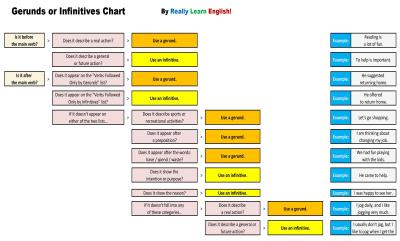How Should The Sentence Be Revised To Replace The Infinitives With Gerunds? Check All That Apply.
Gerunds and Infinitives
What is the difference between gerunds and infinitives? When should you use each? Let's start from the beginning.

Click Here for Step-by-Step Rules, Stories and Exercises to Practice All English Tenses

What is a Gerund?
A gerund is a noun made from a verb. To make a gerund, you add "-ing" to the verb.
For example:
In the sentence "I swim every day", the word "swim" is a verb.
In the sentence "I like swimming", the word "swimming" is a noun.
Therefore, "swimming" is a gerund.
Second example:
In the sentence "She reads several books a week", the word "read" is a verb.
In the sentence "Reading is important", the word "reading" is a noun.
Therefore, "reading" is a gerund.
More examples of gerunds: buying, fishing, running, watching, telling, and so forth.
The word "gerund" actually comes from the Latin word gerere, which means "do".
You could say this actually makes sense: the gerund describes an action, something you do.
Gerunds are often used when actions are real or completed.
Examples:
(Note how the main underlined verb relates to real or completed actions.)
- She stopped smoking.
- I finished doing my homework.
- They keep on fighting.
- We discussed moving to Florida.
- You recommended waiting until tomorrow.
- He recalled falling asleep on the couch.
- She practices playing those drums all the time.
- John finished fixing the car.
- The job involves dealing with animals.
- Brian mentioned staying up late.
- They suggested not keeping the luggage.
- We started working on this yesterday.
What is an Infinitive?
An infinitive is the basic form of the verb + "to".
Examples: to buy, to fish, to run, to watch, to tell, and so forth.
Example Sentences:
"I want to swim."
"They asked us to leave."
"To be, or not to be – that is the question."
"The goal is to win."
The word "infinitive" comes form the Latin word infinitus, from in- (not) and finitus (finished, limited).
You could say this actually makes sense: the infinitive describes an action, but unlike a regular verb, it is not limited in any way.
The regular verb is limited to the tense and subject. For example, in the sentence "Diana danced" the action is limited to Diana and to the past.
However, the infinitive is unlimited. In the sentence "To dance is easy", the action is not limited to any subject or to any time.
Infinitives are often used when actions are unreal, general, or future.
Examples:
(Note how the main underlined verb relates to unreal, general, or future actions.)
- Kate agreed to come.
- I hope to see you soon.
- We plan to finish this shortly.
- They decided to return home.
- She promised to stop smoking.
- We agreed never to talk about it again.
- He offered to sell the house.
- I refuse to pay!
- You seem to be disappointed.
- She asked him not to leave.
- I want to drink.
- They need to get up early.
Gerunds or Infinitives?
If you want to speak correct and natural English, you should know when to use gerunds, and when to use infinitives.
Click the following link for the list of verbs followed only by gerunds.
Click the following link for the list of verbs followed only by infinitives.
To make a long story short, you can use the "Gerunds or Infinitives Chart" to help you decide which form to use. Click on the small picture to see the full sized version.

Here is the full explanation:
Part I
The basic difference between gerunds and infinitives is the following:
Using a gerund suggests that you are referring
to real activities or experiences.
Using an infinitive suggests that you are
talking about potential or possible activities or experiences.
So let's say you eat ice cream every day. This is an actual action you are doing. Then you could say: "I like eating ice cream".
On the other hand, if you are on a diet, and you don't usually eat ice cream, then you are talking about a potential action. You could say: "I like to eat ice cream."
When used before the main verb, gerunds tend to sound more like natural English.
For example, the sentence "Playing tennis is a lot of fun" sounds more natural than "To play tennis is a lot of fun". The latter sentence sounds more theoretical.
Part II
After the main verb, both gerunds and infinitives can be used.
The main verb in the sentence determines whether you use a gerund or an infinitive.
Some verbs take only a gerund.
Some verbs take only an infinitive.
Some verbs can take both gerunds and infinitives, with only a slight difference in the meaning (as explained in Part I above).
A few verbs take both gerunds and infinitives, but with a significant difference in the meaning.
Part III
So when you need to decide which one to use, first check whether the main verb is limited only to gerunds, or only to infinitives.
If the verb is not on any of the lists, you can use the following guidelines:
- The word "go" + sports or recreational activities usually take a gerund.
Examples: "Let's go shopping", "They went skiing". - After a preposition you should use a gerund.
Examples: "I will talk with you before going to lunch", "I am looking forward to working with you". - Expressions with the words "have", "spend" and "waste" take a gerund.
Examples: "She had fun skiing", "He wasted all his time worrying". - In many cases, the infinitive form is used to show the intention or purpose.
Examples: "We are here to help", "He left to catch the train". - The infinitive form is also used to show the reason.
Examples: "We were sad to hear about your difficulties", "She was shocked to learn the truth". - If none of these guidelines apply, simply use the principle in Part I above.
Does it describe a concrete action? Then use a gerund.
Does it describe a general or potential action? Then use an infinitive.
Examples: "As a painter, I truly love painting",
"I love to paint. I wish I would paint more often."
Anyhow, whenever you are in doubt, you can always use a dictionary to help you out! Oxford Advanced Learner's Dictionary is a really good one to use. It shows you whether the verb requires a gerund, and infinitive, or can take both. Just look at the data below the definition.
Note: For an advanced tutorial on the subject visit the English Page tutorial on gerunds and infinitives.
Gerunds and Infinitives Exercises
Gerunds and Infinitives Final Test
Gerunds and Infinitives Final Test
See also: "Used to" with Infinitive or Gerund
How Should The Sentence Be Revised To Replace The Infinitives With Gerunds? Check All That Apply.
Source: https://www.really-learn-english.com/gerunds-and-infinitives.html
Posted by: wolakofas1945.blogspot.com

0 Response to "How Should The Sentence Be Revised To Replace The Infinitives With Gerunds? Check All That Apply."
Post a Comment